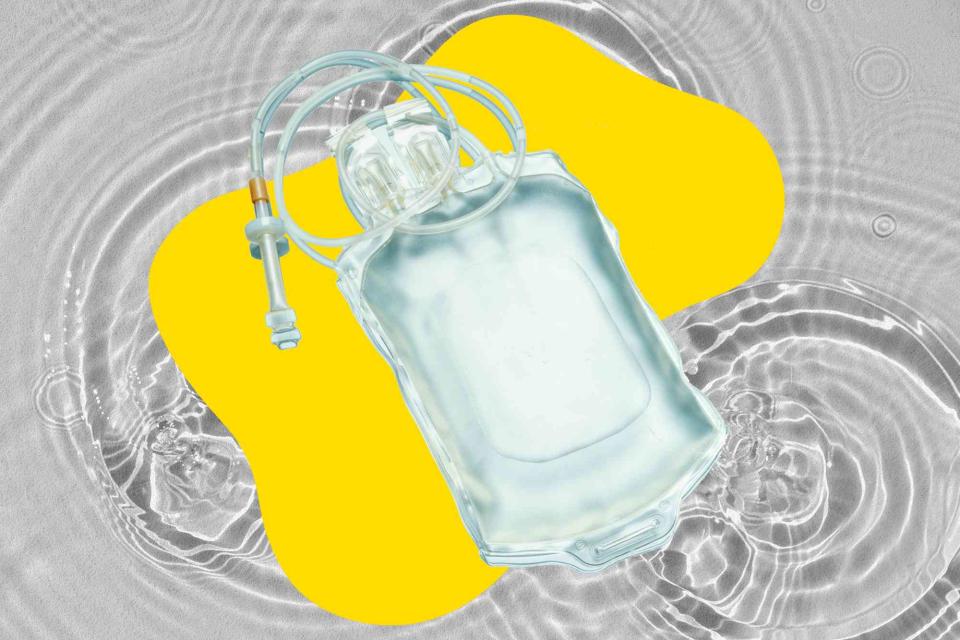People Are Getting IV Vitamin Drips for Hydration—Here's What a Gastroenterologist Thinks of This Health Trend
IV vitamin drips are all the rage. But are they healthy and do they work? Before you give the trend a try, read this.

Reviewed by Dietitian Jessica Ball, M.S., RD
By now, you've probably seen the headlines about celebrities—like Gwyneth Paltrow and Chrissy Teigen—praising IV vitamin drips, also called IV vitamin therapy.
The claim is that slowly injecting vitamins through an IV will help hydrate and nourish you, increase your energy, slow down the signs of aging, provide you with radiant, glowing skin and (of course) help you lose weight—among many other things.
Related: 5 Things You Should Do Every Day for Your Gut Health, According to a Gastroenterologist
Getting a hefty cocktail of vitamins delivered straight into your body through an IV sounds healthy—but is it? That depends, says Megan Rossi, Ph.D., AKA The Gut Health Doctor, in a June 2023 Instagram reel.
Rossi, a lead research fellow at King's College London and author of Eat More, Live Well, points out that there's really nothing novel about IV vitamin drips, despite the hype surrounding them in recent years.
"In truth, IV drips are actually nothing new. In fact, they've been around for centuries for helping people who are critically ill who can't eat or drink, to stay alive essentially," says Rossi. "It's only been more recently where they're now being packaged into these expensive services and pitched to the masses."
And you don't have to go to the hospital to get it. From alternative and functional medicine practitioners to spas and "drip bars," chances are you can find a provider near you. Some may even come to your home to administer it. But before you sign up to have an IV stuck into your arm, there are a few things to consider, warns Rossi.
First up: Any time there's a needle involved, "there's always a risk of infection, so be cautious about who's delivering the service," advises Rossi.
"Secondly," says Rossi, "when you actually eat your nutrients, you've got a very clever gut that ensures you don't absorb too much if you overdo it on a particular type of nutrient. Whereas, IV drips completely surpass this clever gut, and therefore, you're at much higher risk of overdosing on nutrients."
In other words, too much of a good thing is still too much.
This can also apply to the cost of the infusion. While it depends on the formulation and where you're getting it, plan on spending anywhere from $100 to $400 and up.
Then there's the age-old question: Does it even work?
Rossi points to an older 2009 Yale study published in the Journal of Complementary and Alternative Medicine that showed no significant difference in relief from fibromyalgia symptoms between those who did weekly IV vitamin drips for 12 weeks and those who received a placebo drip.
And it's hard to find solid research on healthy people being infused with vitamins through an IV. Because of this, researchers in a 2021 article in Nutrition Today caution that there is insufficient evidence to promote IV vitamin drips and that there is the potential of doing harm—including overdosing on certain vitamins and creating a shortage of IV nutrition for people who are ill and really need it.
"So, overall, the research suggests it's better to get your nutrients in via a whole foods diet," concludes Rossi.
Bottom Line
We agree with Rossi. It is better to get your nutrients by eating a wide variety of whole foods, including whole grains, fruits, vegetables, dairy, protein and healthy fats. If you feel you might be lacking in nutrition, talk to your healthcare practitioner or a registered dietitian to see how you can get the nutrients you need. They might suggest taking a multivitamin, which can add a little extra insurance—and you don't need to spend a lot of money or hook up to an IV to take it.

